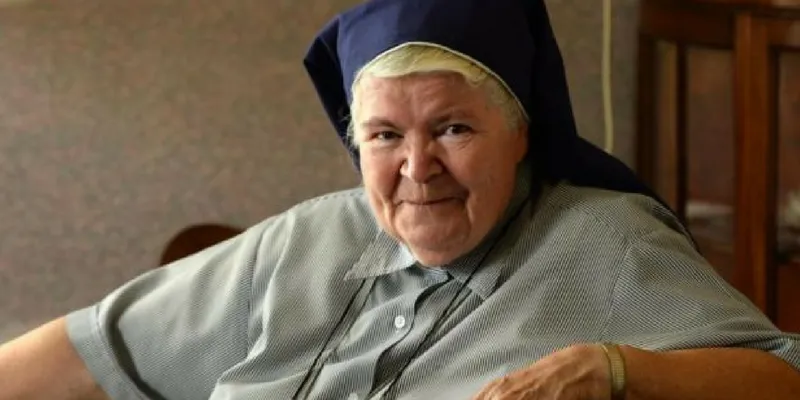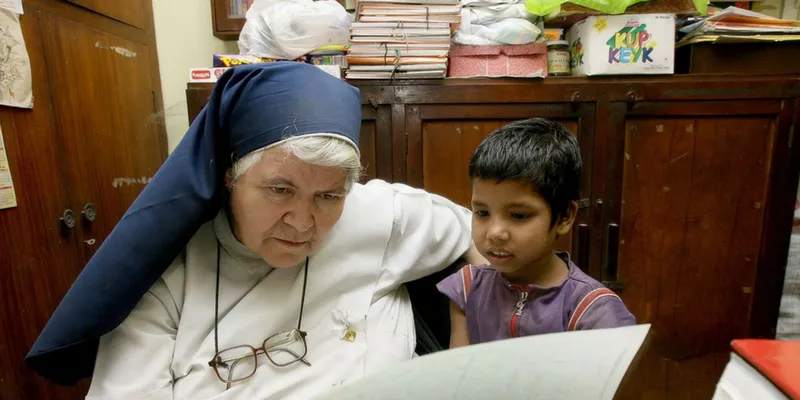For six decades, this Irish nun is ushering social reforms through education
She believes that education, not charity, is the way to bring a change in India's existing educational and social system. And to turn this thinking into reality, she battled inequality in the classroom by pioneering school reforms.

This is the story of Sister Cyril, an Irish nun, who has been living in Kolkata for the past six decades. Her first impression of Kolkata was that of a hot, humid and crowded city, but what moved her emotionally was the poverty and hopelessness of children dwelling in Kolkata's numerous slums. And she had a different approach towards uplifting these slum dwellers whom the upper classes often looked down upon. Sister Cyril told IANS in an email,
It struck me that we live in a layered society whose upper levels have little to do with the lower levels unless the latter come into the former's houses as domestic help. It will be very difficult to change this system unless we bring all children from all backgrounds and mix them together on an equal footing. Only then will it be possible for us to have a fully integrated nation.
She remembered that when she began her experiment in 1979, there was hardly any support from the local residents. In the same year, she took charge as the principal of Loreto Convent, Sealdah, an institute where mostly students from well-to-do families studied.
Questions were raised when she decided to open the doors of the school to slum children, but she was determined to bring about change in society through educational reforms. She fiercely battled the inequality in the classrooms and now Loreto has 50 percent of its seats reserved for children from economically backward families. She said,
The people said it couldn't be done, I have proved that it can -- by creating a school where all children are friends even though they belong to radically different backgrounds.
Not just this, but Sister Cyril, who recently co-authored a book Girls Are Our Future -- Thoughts of a Practical Radical Nun, has been the brain behind many social initiatives such as "Rainbow Homes", the "Brickfields Project" and "Barefoot" which helped tremendously in educating children belonging to the poorest sections of the community.
These 60 years have been quite a challenging journey for her. From landing in Calcutta in 1956 till now, Sister Cyril has seen many facets of the city -- indeed, has seen it changing. Not just infrastructural development, Sister Cyril believes that there have been many vital educational reforms brought in by the West Bengal government over the years. Now, she finds even the slum children carrying a school bag and walking towards a school. For her, this is a satisfactory improvement.

But there are still a few black spots that exist. One of these, she pointed out, was the marginal socio-economic development in the city's slums. The nun noted,
Very little improvement can be seen in the slum areas and in many cases the people are dislodged for high-rise buildings (to come up). The slum dwellers have been simply pushed to the outskirts.
Kolkata has been home to many missionaries and charitable institutions, and with Mother Teresa, the city also learned compassion and empathy, but unlike Mother Teresa who believed in charity, Sister Cyril has always strongly believed in helping such children through education. She explained,
We (Sister Cyril and Mother Teresa) had a good working relationship, she gave help to destitute people while I believed strongly in educating children so that they can get employment and support themselves to be independent.
Asked if she ever thought of going back to Ireland, Sister Cyril firmly said no. She added,
Though some of my ideas would have been good for Ireland, there was no moment when I seriously considered going back -- except maybe in the very hot summer months of April and May.
With inputs from IANS
Do you have an interesting story to share? Please write to us at [email protected]. To stay updated with more positive news, please connect with us on Facebook and Twitter.







